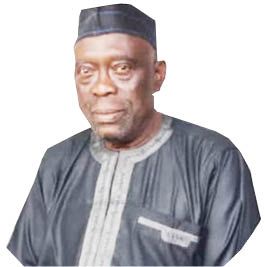Tribute to George Kwanashie, an erudite scholar
The assassination of Murtala Mohammed on February 13, 1976 opened the sky of power to a generation of young academic pioneers at the Ahmadu Bello University, Zaria. News of Murtala’s political ‘New Gale’ bashing a corrupt military regime being terminated coincided with a weekend party by expatriate academic staff and their families. Fuming admirers of […]

10weeklypage18
The assassination of Murtala Mohammed on February 13, 1976 opened the sky of power to a generation of young academic pioneers at the Ahmadu Bello University, Zaria.
News of Murtala’s political ‘New Gale’ bashing a corrupt military regime being terminated coincided with a weekend party by expatriate academic staff and their families.
Fuming admirers of Murtala assumed that foreign intelligence operatives were celebrating a successful foreign policy against Nigeria’s revolution. The fiesta was invaded by student militants who punched and kicked their expatriate teachers.
An exodus of frightened Euro-American staff opened the sky for headships of departments and deanships of faculties to a new team, including A.D Yahaya (Political Science), Odama (Economics), Isa Mohammed (Mathematics), Yusuf B. Usman (History) and others.
- Ace broadcaster, Onwudiwe, emerges FCT SWAN chairman
- We’re on course to achieve HIV epidemic control – FG
George Kwanashie would become part of a Bala Usman academic platoon who went to war in reforming contents of syllabuses and direction of research.
Two main streams of research emerged. Mahmud Tukur worked on applying Walter Rodney’s focus on British colonialism ‘developing’ northern Nigeria backwards into economic decay; Monday Mangvwat applied the theory on the mining economy of the Plateau; Ahmed M. Mohammed tracked greedy footprints of the United Africa Company; Enoch Oyedele reported on colonial urbanisation, and George Kwanashie focused on the impact of new elites emerging out of the cocoon of colonial education and political movements in northern Nigeria. This was the modernist stream.
A stream from the pocket of Abdullahi Smith celebrated pre-colonial political genius. Y.B Usman researched the evolution of Katsina; Mahmud Ahmad dissected Muri Emirate, while Okwede explored the Igala experience. Kanem Borno, and Fombina had their day in this intellectual sun.
Kwanashie and Tukur rummaged through Arewa House under the guidance of Abdullahi Smith – a British convert to Islam who laboured with an enthusiasm from a new divinity. The two academic lads, however, remained decidedly modernist in their intellectual animation.
Kwanashie shared the Oxford/Cambridge culture of recruiting the most brilliant first degree products into academia and pushed them to become experts in a field of research. A “fellow’’ interested in the physics of a butterfly’s wing, for example, was expected to explore it on butterflies in the Indian subcontinent, the mountains of Peru, dense tropical forests in the Democratic Republic of Congo, and around pools in Finland etc.
Kwanashie focused on exploits of new elites in northern Nigeria engaged in building , sustaining and giving vision to a new university. He shared with Bala Usman the conviction that this institution produced a new power known as ‘’Academic Knowledge’’ built on a labour process known as “research.’’
If northern Nigeria was to compete for power in Nigeria, the African continent and the global North, it had to build its own academic warriors. The British Empire was, after all, run by a branch of the most brilliant graduates from Oxford and Cambridge.
Kwanashie built and sustained the morale and devotion to knowledge as ‘missionary work’ despite low income compared to high harvests by politicians and contract-awarding civil servants. As an example, to sustain the morale of a newly returned holder of a Doctor of Philosophy, he stage-managed repeated ties in votes cast for two contestants for the post of “assistant dean’’ until voters agreed on a formula, which gave a post to both contestants. He had invented and sustained votes for the new returnee.
With Bala Usman, they stepped aside from power to guide and groom those who would take over from them. As Professor Ishaya Audu, the vice chancellor of ABU affirmed, the Kwanashie-Usman team ensured that policy proposals they crafted became adopted by the federal government. Knowledge and power had to match together. The Ahmadu Bello University would not be a silent “backland.’’
In 1980, George Kwanashie predicted that the Sahara Desert would provoke conflicts between nomadic cattle herders and farmers. As businessmen and politicians bribed traditional rulers to allow them block traditional routes to pasture and water, the Sahara Desert would get new allies. The Middle Belt would become a zone of economic warfare.
The Kwanashie-Usman team roused formidable opponents. Accusation of breeding rebels against feudal classes was camouflaged as a Middle Belt plot to breed revolutionaries. Professor Jibril Aminu was alleged to have directed that 60 per cent of new admissions into ABU should be to the Science Faculty even when there were no candidates.
Military officers in FASS warned that their bosses were against a very popular project – the “Mock OAU Summit.’’ It was anchored on the creativity of students. When the network programes of the Nigerian Television Authority (NTA) broadcast it in 1988, it was blocked on ABU campus by an explosion of religious ‘”war’’ between ‘’Christian and Muslim platoons.’’ Religious war deposed the Bala Usman-George Kwanashie regime of “socialism.’’
With his death, George Kwanashie shall certainly meet Dr Yusuf Bala Usman waiting for him and waving a plan for the renewal of the ABU at the airport in ‘Beyond-Africa.’
